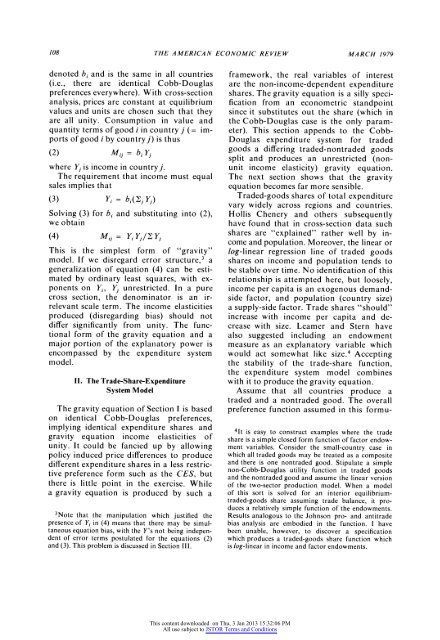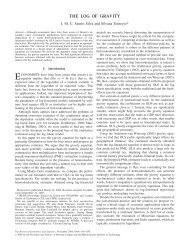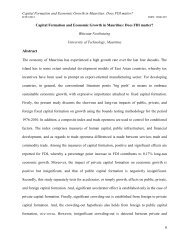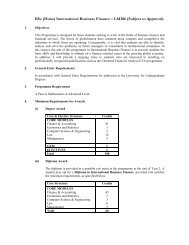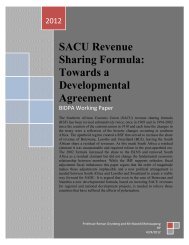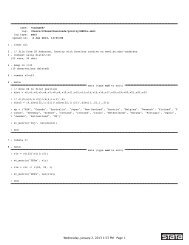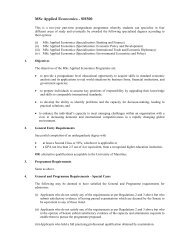A Theoretical Foundation for the Gravity Equation
A Theoretical Foundation for the Gravity Equation
A Theoretical Foundation for the Gravity Equation
Create successful ePaper yourself
Turn your PDF publications into a flip-book with our unique Google optimized e-Paper software.
108 THE AMERICAN ECONOMIC REVIEW MARCH 1979<br />
denoted bi and is <strong>the</strong> same in all countries<br />
(i.e., <strong>the</strong>re are identical Cobb-Douglas<br />
preferences everywhere). With cross-section<br />
analysis, prices are constant at equilibrium<br />
values and units are chosen such that <strong>the</strong>y<br />
are all unity. Consumption in value and<br />
quantity terms of good i in country j (= imports<br />
of good i by countryj) is thus<br />
(2) Mii = biYj<br />
where Yj is income in countryj.<br />
The requirement that income must equal<br />
sales implies that<br />
(3) Yi = bi(2 Y1)<br />
Solving (3) <strong>for</strong> bi and substituting into (2),<br />
we obtain<br />
(4) Mu = Yi Yj/2 Yj<br />
This is <strong>the</strong> simplest <strong>for</strong>m of "gravity"<br />
model. If we disregard error structure,3 a<br />
generalization of equation (4) can be estimated<br />
by ordinary least squares, with exponents<br />
on Yi, Yj unrestricted. In a pure<br />
cross section, <strong>the</strong> denominator is an irrelevant<br />
scale term. The income elasticities<br />
produced (disregarding bias) should not<br />
differ significantly from unity. The functional<br />
<strong>for</strong>m of <strong>the</strong> gravity equation and a<br />
major portion of <strong>the</strong> explanatory power is<br />
encompassed by <strong>the</strong> expenditure system<br />
model.<br />
II. The Trade-Share-Expenditure<br />
System Model<br />
The gravity equation of Section I is based<br />
on identical Cobb-Douglas preferences,<br />
implying identical expenditure shares and<br />
gravity equation income elasticities of<br />
unity. It could be fancied up by allowing<br />
policy induced price differences to produce<br />
different expenditure shares in a less restrictive<br />
preference <strong>for</strong>m such as <strong>the</strong> CES, but<br />
<strong>the</strong>re is little point in <strong>the</strong> exercise. While<br />
a gravity equation is produced by such a<br />
3Note that <strong>the</strong> manipulation which justified <strong>the</strong><br />
presence of Yi in (4) means that <strong>the</strong>re may be simultaneous<br />
equation bias, with <strong>the</strong> Y's not being independent<br />
of error terms postulated <strong>for</strong> <strong>the</strong> equations (2)<br />
and (3). This problem is discussed in Section III.<br />
framework, <strong>the</strong> real variables of interest<br />
are <strong>the</strong> non-income-dependent expenditure<br />
shares. The gravity equation is a silly specification<br />
from an econometric standpoint<br />
since it substitutes out <strong>the</strong> share (which in<br />
<strong>the</strong> Cobb-Douglas case is <strong>the</strong> only parameter).<br />
This section appends to <strong>the</strong> Cobb-<br />
Douglas expenditure system <strong>for</strong> traded<br />
goods a differing traded-nontraded goods<br />
split and produces an unrestricted (nonunit<br />
income elasticity) gravity equation.<br />
The next section shows that <strong>the</strong> gravity<br />
equation becomes far more sensible.<br />
Traded-goods shares of total expenditure<br />
vary widely across regions and countries.<br />
Hollis Chenery and o<strong>the</strong>rs subsequently<br />
have found that in cross-section data such<br />
shares are "explained" ra<strong>the</strong>r well by income<br />
and population. Moreover, <strong>the</strong> linear or<br />
log-linear regression line of traded goods<br />
shares on income and population tends to<br />
be stable over time. No identification of this<br />
relationship is attempted here, but loosely,<br />
income per capita is an exogenous demandside<br />
factor, and population (country size)<br />
a supply-side factor. Trade shares "should"<br />
increase with income per capita and decrease<br />
with size. Leamer and Stern have<br />
also suggested including an endowment<br />
measure as an explanatory variable which<br />
would act somewhat like size.4 Accepting<br />
<strong>the</strong> stability of <strong>the</strong> trade-share function,<br />
<strong>the</strong> expenditure system model combines<br />
with it to produce <strong>the</strong> gravity equation.<br />
Assume that all countries produce a<br />
traded and a nontraded good. The overall<br />
preference function assumed in this <strong>for</strong>mu-<br />
41t is easy to construct examples where <strong>the</strong> trade<br />
share is a simple closed <strong>for</strong>m function of factor endowment<br />
variables. Consider <strong>the</strong> small-country case in<br />
which all traded goods may be treated as a composite<br />
and <strong>the</strong>re is one nontraded good. Stipulate a simple<br />
non-Cobb-Douglas utility function in traded goods<br />
and <strong>the</strong> nontraded good and assume <strong>the</strong> linear version<br />
of <strong>the</strong> two-sector production model. When a model<br />
of this sort is solved <strong>for</strong> an interior equilibriumtraded-goods<br />
share assuming trade balance, it produces<br />
a relatively simple function of <strong>the</strong> endowments.<br />
Results analogous to <strong>the</strong> Johnson pro- and antitrade<br />
bias analysis are embodied in <strong>the</strong> function. I have<br />
been unable, however, to discover a specification<br />
which produces a traded-goods share function which<br />
is log-linear in income and factor endowments.<br />
This content downloaded on Thu, 3 Jan 2013 15:32:06 PM<br />
All use subject to JSTOR Terms and Conditions


